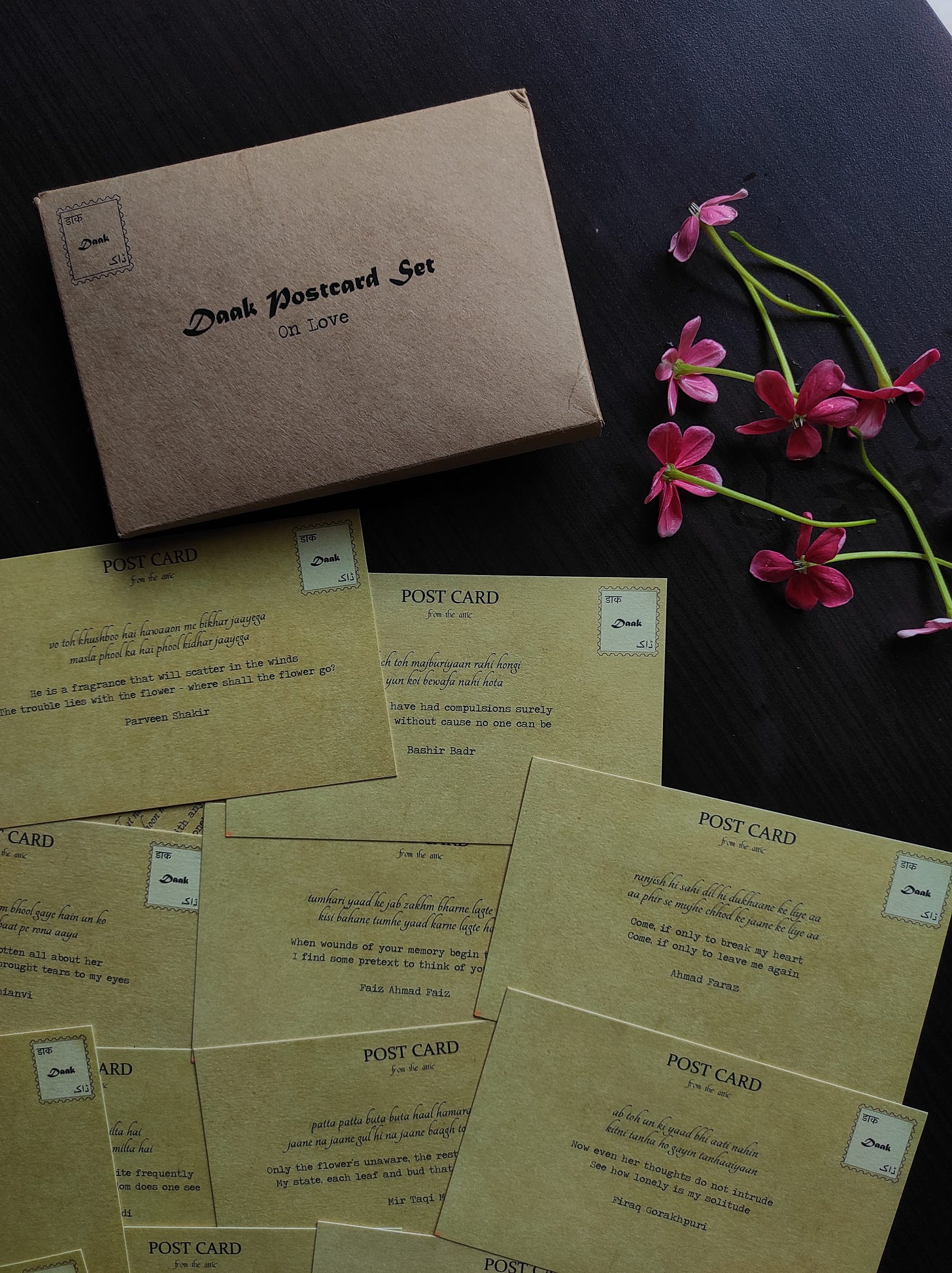On Silence and Solitude in Eunice de Souza’s Poems
This week in Daak:
1. A lovely piece on Eunice De Souza’s poetry — On Silence and Solitude in Eunice de Souza’s Poems — by Trivarna Hariharan
2. If You Love Love…
3. Daak Recommends
1. On Silence and Solitude in Eunice de Souza’s Poems
One of the elements that stands out in Eunice de Souza’s poetry is the precision with which she captures how inter-personal relationships are redefined and undergo fluctuations that are marked by renewed ideas of what the relationship(s), and the interpersonal space between two individuals itself stand for.
Underpinning this is the belief that relationships aren’t entities separate from the two distinct individuals that constitute them. They’re born anew in different sets of circumstances and contexts. Relationships change as individuals themselves change, and one cannot often see or predict those alterations before they occur in time.
Therefore, the study of relationships is also a study of our own selves — the fluctuations of our needs, emotions, and experiences. Which is to say that the study of relationships is also an exercise in observing (and bearing witness to) our individual solitudes.
*
In her poems, especially her love poems, agency and loneliness are so entwined that they can no longer be separated from one another. De Souza’s work (particularly her shorter poems) raise the question of what we long for, and seek in one another in an intimate relationship.
Let us look at this poem titled “It’s Time to Find a Place.”
It’s time to find a place to be silent with each other. I have prattled endlessly in staff-rooms, corridors, restaurants. When you’re not around I carry on conversations in my head. Even this poem has forty-eight words too many.
In this piece, she fleshes out silence as the force that binds two people together: “It’s time to find a place/to be silent with each other.” She paints silence as an almost sacred space we enter in order not to drift away from one another, but rather to come closer to each other — to learn, to understand each other better.
But it also suggests another idea: that individuals need to honour each other’s personal silence and space. To allow each other to retreat into their own personal solitudes so that they have enough room to grow as individuals. I also see this as an act of taking time to recharge and refill themselves in order to return to each other fuller and richer. In doing so, De Souza underlines silence as crucial to the sustenance of any intimate partnership.
She concretises the importance of silence further into the poem by centering it in multiple geographical locations, namely “corridors, staff-rooms, restaurants.” All of these are brief places, fleeting places — ones where we pause or stay briefly before moving onto some other space. It’s as if she’s trying to convey that silence is more of a place than any of the places mentioned above. Or that it’s now about time to reach beyond the transience of talk, into a more permanent space.
This implies that intimacy is, or could be accompanied by the opportunity or possibility of returning to the center of oneself, grounding oneself in one’s own being. It is not just an opportunity to walk towards something — but also to stand still and observe everything that happens within and outside of oneself.
In doing so, she conceptualizes silence as a space of ease. An intimacy void of the need, or the urge to say something to each other all the time. Or in De Souza’s own words, the need to “prattle” with each other “endlessly.” This also reminds me of another poem by De Souza, called “Advice to Women.”
Keep cats if you want to learn to cope with the otherness of lovers. Otherness is not always neglect - Cats return to their litter trays when they need to. Don't cuss out of the window at their enemies. That stare of perpetual surprise in those great green eyes will teach you to die alone.
In it, she talks about “keeping cats” in order to “cope with the otherness of lovers.” She suggests this as an exercise in learning how to reconcile ourselves to both our less pleasant aspects, as well as our personal lonelinesses. To embrace them without resentment or perceiving them as alienating.
And who better than our feline friends to remind us of the pleasure of seeking refuge in the quiet of our own company, or being by ourselves? Who better than cats to teach us the significance of personal space and silence?
And to have all that mirrored back to oneself isn’t a reinforcement of loneliness, but rather an acknowledgement of an individual’s self. It is a way of being seen, and held.
By Trivarna Hariharan
2. If You Love Love…
If you’re one of those people who revels in the complexities of love, this postcard set is for you! It combines the most beautiful shayari on the range of emotions that love encompasses.
3. Daak Recommends:
Watch this short video on Eunice de Souza’s craft and listen to her characteristically unapologetic and undemocratic views on subject and technique.
Did you know that de Souza also wrote a weekly column for the Mumbai Mirror? You can find an archive of her lively pieces here.

